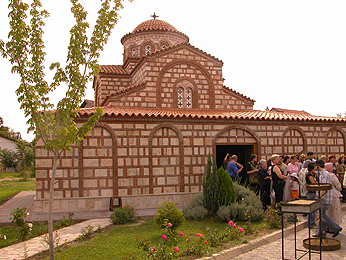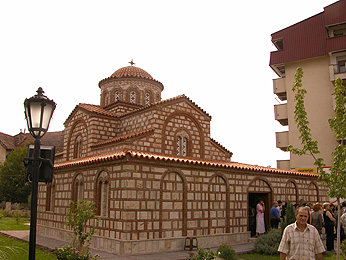Hierarchical Divine Liturgy in Strumica ( 26.08.2007 )
Today, when the Church celebrates the memory of Venerable Maximus the Confessor, Metropolitan Nahum of Strumica celebrated Hierarchical Divine Liturgy in the Strumica church of St Gregory Palamas and of the Holy Great-martyr Demetrius the Myrrh-bearer.
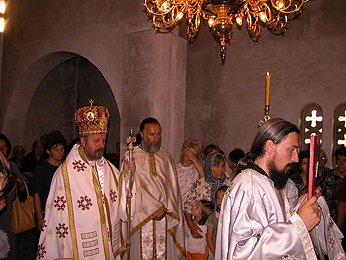
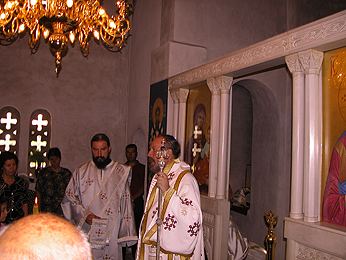
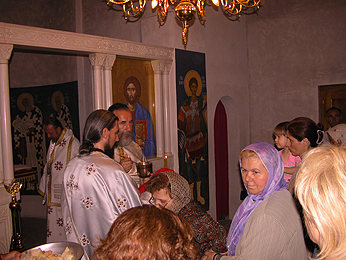
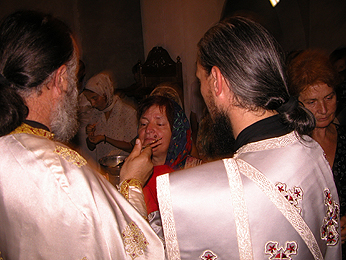
Here is an extract of His Eminence’s sermon on today’s Gospel reading about the vinedressers:
“In terms of history, the vine, first of all, denotes the chosen people: Israel. The vinedressers are the Old Testament priests; the servants are the Old Testament prophets. The Beloved Son—Christ the Godman. Still, the moral of today’s Gospel reading most directly refers as well to the present-day New Testament clergy—that is, to contemporary Episcopes, presbyters, and deacons; and also to the present-day vine—the New Testament people of God, i.e. the Church.
This Gospel reading’s interpretation, from ascetical point of view, reveals to us the reasons for the murders of the ones sent: the servants i.e. the prophets, and the Son—Christ. Regarding this, two questions arise:
- First, which or what kind of fruit were the vinedressers (priests) supposed to offer to God?
- Second, what kind of fruit do they actually bring forth, wishing to misappropriate the same?
According to the holy apostle Paul, the fruit of the Spirit that the vinedressers should have offered to God from His vine (the faithful people of God) is: love, joy, peace, longsuffering, kindness, goodness, faithfulness, gentleness, self-control (Gal. 5:22). This, for the clergy and in the Church, means nothing but the liturgical one: Having asked for the unity of the faith and the communion of the Holy Spirit, let us commit ourselves and one another and all our life unto Christ our God.
In order to achieve this ecclesiastical end, God’s cleric (the Episcope or presbyter) must first purify himself from his heart’s passions, illumine his mind and possibly deify himself, for only then to lead on this same road of purification from passions, illumination, and deification the God’s people entrusted to him. Passions are the main reason why love among people and also Church unity are degraded: If we live in the Spirit, let us also walk in the Spirit. Let us not become conceited, provoking one another, envying one another (Gal. 5, 25-26).
Here it is how the holy apostle James describes the struggle stirred both within us and among us due to passions: Where do wars and conflicts come from among you? Do they not come from your passions that war in your members? You lust and do not have. You murder and envy and cannot obtain. You fight and war. Yet you do not have because you do not ask. You ask and do not receive, because you ask amiss, that you may spend it in your passions. Adulterers and adulteresses! Do you not know that friendship with the world is enmity with God? Whoever therefore wants to be a friend of the world (of passions and of demons), makes himself an enemy of God (James 4:1-4).
Thus, it does not suit the vinedressers, possessed by self-love, that the vine produces fruits pleasing to God; they desire fruits that will nourish their passions. It is much obvious that it all begins with the vinedressers’ demonic self-love: This is the Heir. Come, let us kill him, and the inheritance will be ours (Mark 12:7). Self-love incorporates the three main passions that manifest themselves in the vinedressers i.e. in the clergy:
1. Vainglory forces people to fight among them for power and glory—this being done even to the detriment of Church unity and of the overall witness to Christ that the Church ought to demonstrate in this world, for the salvation of the world: By this all will know that you are My disciples, if you have love for one another (John 13:35). At present we are all witnesses that instead of love and Church unity, the clergy display a struggle for ecclesiastical domination, for human glory and praises—from the local to the level of the whole Orthodox community. Instead of being witnesses to Christ, they bear witness to themselves. Misery…
2. Avarice—the clergy satisfy this passion by favouring that service in the Church (or, more precisely, they alter the very service) that brings them money, and the service in the Church that lines not their pockets they neglect. We are all witnesses that today are neglected the Holy Mystery of Eucharist—Communion of the Body and Blood of Christ, as well as the Holy Mystery of Repentance—confession of one’s sins and spiritual guidance; they, thank God, are free of charge…
3. Pleasure-indulgence forces people to satisfy their bodily passions, whether it comes to indulgence in food or in fornication. This passion manifests itself also in the claim of some among the clergy that they can always receive Communion, even without having fasted, while at the same time they set conditions for the faithful laity, making them fast more than the Holy Church led by the Holy Spirit has established…
All that I am saying here is perhaps not much popular to say; but why should we keep silent about what the Holy Gospel so clearly points out to us…? Speaking this I do not exclude myself from the ones who are still fighting against their passions; let no one think… I am saying this because of the ones who do not have the slightest idea of what is happening to them, although that is so obvious… Nonetheless, let us pray for our clergy (for the Episcopes and for the presbyters); let us not slander and judge them… In this way, may God’s blessing be with you all!”
